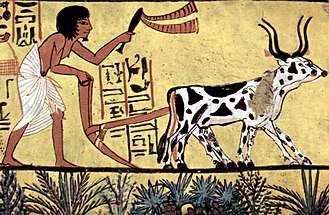Zero waste agriculture
Zero waste agriculture is a type of sustainable agriculture which optimizes use of the five natural kingdoms, i.e. plants, animals, bacteria, fungi and algae, to produce biodiverse-food, energy and nutrients in a synergistic integrated cycle of profit making processes where the waste of each process becomes the feedstock for another process.

| Agriculture |
|---|
 |
|
Categories
|
|
|
History
The integration of shallow microaglal oxidisation ponds was demonstrated by Golueke & Oswald in the 1960s. The widespread global implementation of these systems can be largely credited to Prof George Lai Chan (02 March 1924 Mauritius-08 October 2016 Mauritius) from ZERI.[1] Zero waste agriculture is now practiced in China (ecological farming), Columbia (integrated food & waste management systems) & Fiji (integrated farming systems), India (integrated biogas farming), South Africa (BEAT Coop & African Agroecological Biotechnology Initiative) and Mauritius. The Brazilian government has adopted integrated farming system as a major social technology for the uplifting of marginalized and subsistence farmers through coordination with TECPAR.[2]
Zero waste agriculture combines mature ecological farming practices that delivers an integrated balance of job creation, poverty relief, food security, energy security, water conservation, climate change relief, land security & stewardship.
Practice
Zero waste agriculture is optimally practiced on small 1-5 ha sized family owned and managed farms and it complements traditional farming & animal husbandry as practiced in most third world communities. Zero Waste Agriculture also preserves local indigenous systems and existing agrarian cultural values and practices.
Zero waste agriculture presents a balance of economically, socially and ecologically benefits as it:
- optimizes food production in an ecological sound manner
- reduces water consumption through recycling and reduced evaporation
- provides energy security through the harvesting of biomethane (biogas) and the extraction of biodiesel from micro-algae all of which from as a by-products of food production
- provides climate change relief through the substantial reduction in greenhouse gas emissions from both traditional agriculture practices and fossil fuel usage
- reduces the use of pesticides through biodiverse farming
See also
- Integrated Multi-Trophic Aquaculture
- Miniwaste
References
- Zero Emissions Research & Initiatives ZERI
- Paraná Technology Institute Archived January 2, 2009, at the Wayback Machine TECPAR